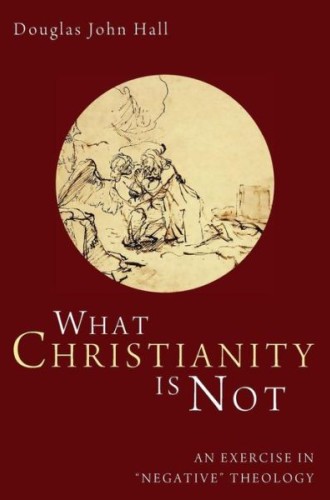What Christianity Is Not, by Douglas John Hall
In essentials unity; in nonessentials liberty; in all things charity.” It is a great slogan, one that my own denomination holds dear. But what are the essentials around which we’re to unite? Creedal statements are intended to reflect a consensus, but no lasting consensus has yet been reached. Perhaps it would be better to identify what Christianity is not.
If we’re to take this negative route to a reach a positive outcome, we will need an experienced and thoughtful guide. Few persons are better equipped for this task than Douglas John Hall, professor emeritus of Christian theology at McGill University in Montreal. Hall claims that What Christianity Is Not, which he completed at the age of 84, is his last book, a final theological testament.
Read our latest issue or browse back issues.
It is appropriate that Hall opens the book with a dedication to his grandchildren. He writes as one who recognizes his own mortality and ponders the future of the faith to which he has devoted his life. As he surveys the current scene, he sees expressions of Christianity that are, in his estimation, “spiritually cheap and intellectually debased” and that will not succeed in addressing the spiritual angst of our age.
Humans are restless beings until we find rest in God’s presence. With this spiritual need in mind, Hall joins Augustine in calling us to seek to understand the faith we profess. This means discerning its center or essence. To do this we will need to set out on an apophatic quest that leads us to the life, death and resurrection of Jesus. Hall writes that “his story announces so poignantly and unforgettably how love, despite all that negates and demeans it, is the origin and end of all that is: the alpha and omega, as the scriptures say.”
What then does Hall contend that Christianity is not? It is not a culture-religion, a religion of the book or a doctrine. It is not a system of morality, the church, or even “the Truth.” Although Christianity exists within culture, has a book, formulates doctrines, teaches morality, takes on institutional form and claims to know something of the truth, it is much more than any of these.
The Christian faith is nothing without Christ and the cross at the center, which is why Hall is worried that in their effort to address the cultured despisers of our age, progressive or liberal Christians, among whom he would number himself, appear ready to abandon Jesus’ centrality to the Christian faith. The task of Christianity, he suggests, isn’t making the faith more palatable to the world, but ensuring that “what the multitude hears is really the gospel and not some culturally biased religious doctrine or secular ideology that obscures the gospel and offends and alienates others wrongly or needlessly.” What he’s calling for is a thoughtful, intellectually satisfying presentation of the gospel that doesn’t become stuck in a quagmire of moralism, doctrinal narrowness or institutional lethargy.
Hall takes a prophetic journey to the center of Christianity with scripture as one partner and with Tillich, Barth and Bonhoeffer as well. With these partners he revisits the neoorthodox challenge to religion that seeks to grasp and domesticate God. By letting go of our need to control God, Hall proposes, perhaps we can find the center that transforms lives.
Though he takes an apophatic approach, Hall doesn’t want to leave the impression that there’s nothing positive to say. If we’re to take the negative road, we must start the journey with the assumption that there is also a kataphatic theology: the positive is there, but we must allow it to be revealed. In his afterword, Hall writes: “The conclusion that Truth transcends and defies definition should not be turned into a premise.” That is, the mystery of faith doesn’t excuse us from the task of persistent and at times frustrating “devotion to the discipleship of seeking a deeper understanding of what we believe.”
With eloquence and insight, Hall leaves us with an important testament to his faith and to the need to take up the theological task with great seriousness. He writes to the entire church, but it’s clear that he has in mind those who are left of center and are tempted, in the name of pluralism, to jettison the center. We would be wise to heed this word of guidance if we’re to find unity in God’s presence.







